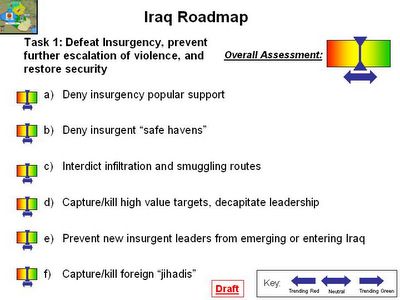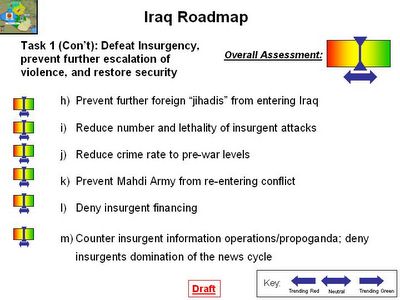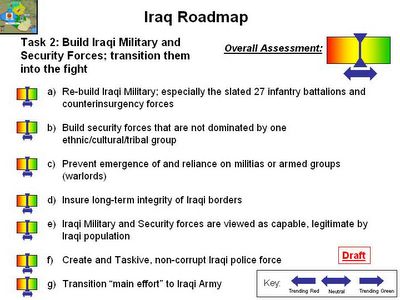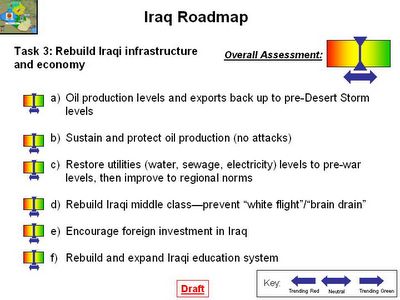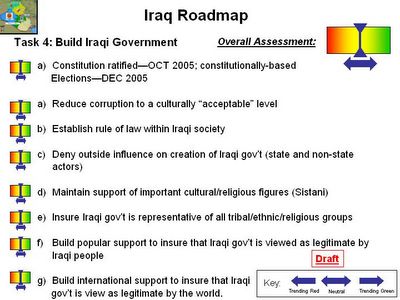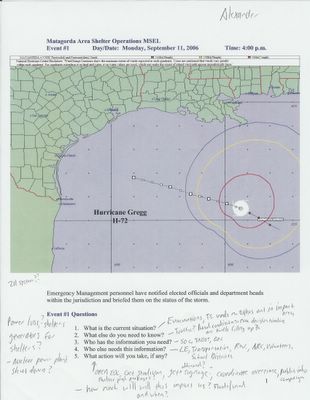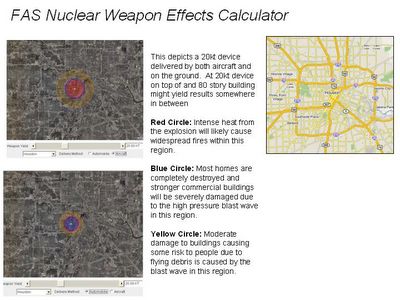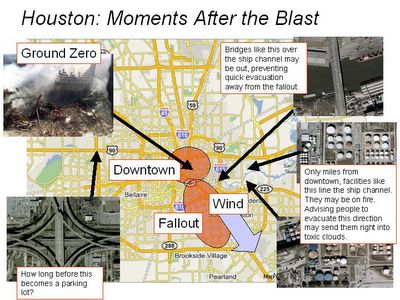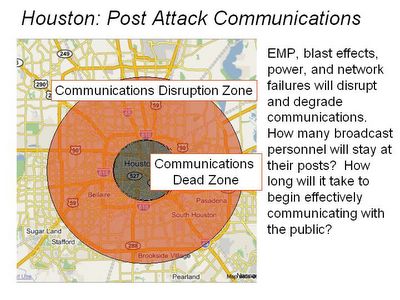Transformation, Nation Building, and the Federal Government
In the aftermath of Tropical Storm Allision, the volunteer community prepared and disturbed over one million meals to people impacted by the disaster. Trained volunteers from throughout the country converged on Houston to render aid in a time of great need. What does that have to do with anything? Keep reading.
I am currently working on a magazine article (that’s my opening salvo of shameless self-promotion, more to follow) that touches on re-construction issues in the GWOT. I’ve done several interviews and a ton of research. I’ve started noticing some patterns and trends in terms of reconstruction. Basically, we’re not very good at it. The political clamoring about “no nation building” wasn’t just rhetoric. It’s a fact. We “don’t do nation building” by design. And that’s a problem if we’re serious about winning the GWOT.
Our government and military is still very much stuck in the Cold War model. Like it or not, the Army is engaged in “transformation”, an attempt to break from the Cold War model and be a force more appropriate for the post-Cold War world. So far, it’s been a mixed bag, but it’s a start.
One of the things that I’ve noticed about the Cold War was that we paid a great deal of attention to defeating Soviet Tank Armies, but not much attention to what happened afterward. You’ve crushed the Russian hordes, what next? It might be too simple to label the apparent inadequacy of Phase IV planning in Iraq as bad political leadership. Instead, it may the culmination point of generations of bad policy. Our government is just not set up to “own” and govern a foreign country of 25 million people. Imperialists we ain’t.
But, we own two large countries right now, and there is the potential for more. Let’s say that we end up in a military show-down with North Korean, and we, along with our allies, now “own” that country. If we can all agree that our reconstruction efforts in Iraq and Afghanistan have been hit or miss. How do we get better for next time? And sooner or later there will be a next time.
In my research, I’ve noticed the recurring theme that reconstruction tasks have not been accomplished because of security. The folks in the government with the knowledge and expertise weren’t willing or able to get into dicey situations that they didn’t sign up for. That’s left unfilled positions in our reconstruction efforts. That’s also caused much of the work to migrate to private firms and private security companies. And again, that’s been a mixed bag.
So how does the government fix the problem? We may already have a model in our emergency management and homeland security communities.
Texas Task Force One is Texas’ Urban Search and Rescue Team. They deployed to ground zero after Sept 11th, and are a state as well as national resource. The team is not a standing team. Folks aren’t waiting around for buildings to collapse. Instead, its members are essentially “reservists” who pull together in a disaster.
Team members come from a variety of backgrounds mostly in Fire and EMS. In order to be on the team you have a certain level of proficiency and training. You also have to keep your skills up-to-date and participate in training and exercises. Team members also have the approval/understanding of their employers that they can be called away for a response. To me it sounds a lot like the military reserves.
There are several other types of teams that follow this model. Ranging from disaster medical, mortuary, and logistics teams these groups of people are trained professionals who skills are only occasionally needed like say when a tornado rips through Jarell, TX …or when you invade a country in serious need of an extreme home make over.
The government should use this model to establish a standing reserve civil affairs task force (RCATF) that is not part of the military, but instead made up of civilians with critical skills and models along the lines of Texas Task Force 1. The RCATF would draw from both government and non-government employees in skill areas such as agriculture, medicine, government, commerce, emergency services, and law enforcement.
Volunteers would receive training in force protection and interaction with the military. They would sign up with the implicit knowledge that they might be put in harm’s way. They would participate in exercises with the military, and get continuous training one a monthly and annual basis. And they’d be paid for their time.
A good example of how to use them is annual Cobra Gold Exercise in Thailand. I went last year and found it an extremely enriching experience. I got to work with soldiers from several countries, and learned a bunch. During the exercise, the Sergeant Majors from the various units got together and took up a collection for a local school. They bought supplies and did some reconstruction work. It was an informal process. Why not make it formal?
Why not bring deploy a package of cops, firefighters, EMTs, veterinarians, and other government-types along with the military element? This group could be sent into the areas near where the exercise was taking place and help train the host nation. They would be practicing the skills of nation building while helping build goodwill to our country. Our Civil Affairs soldiers do this all the time, but there is never enough of them to go around.
Or take for instance a city manger in a medium sized town. He’s forgotten more about governance than you and I will ever know. Maybe he’s a veteran too old for the reserves, but instilled with a burning desire for public service. He won’t quit his job to sign on with Halliburton, and he’s not an Ivy Leaguer so the State Department won’t hire him. So he’s left out, and our country doesn’t tap into a valuable resource.
Right now the bulk of this type of work rests in the hands of the military and agencies like USAID. The problem is that the military and the government only have limited capacity and have problems generating more. You go to war with the government that you have, not the one that you wish you had.
So let’s go back to our volunteer effort in response to Tropical Storm Allison. What does that have to do with this? For me it’s all the proof you need that a program like this will work. The desire to serve the greater good runs deep in our country. I’ve seen it over and over again in my interaction with the volunteer community. But military service isn’t for everyone so why don’t we create another way to contribute while exapanding our capacity to conduct nation building? If you build it, the volunteers will come.
Postscript: There are three categories of professionals that I should have mentioned. First, we should include engineers (my engineer wife as an example of brain power). I've worked with the Army Corps of Engineers on disaster recoveries, and they are second to none. But, they don't have folks like industrial engineers who might help with commmerce.
Second, we should include educators, like my dad. We spend a lot time building schools, but how much effort do we put into helping improve education?
Third, utilty workers. I'm talking about the guys who actually get out and make things like the power and electric work. There is an invisible army at work to make sure that the lights come on when you flip the switch. These folks could probably go a long way to improving the situation in Iraq.




